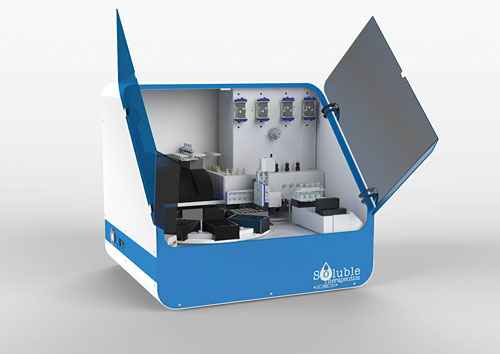September 1, 2012 (Vol. 32, No. 15)
Soluble Therapeutics Designs Methods to Facilitate Development of Protein Formulations
Companies developing biotherapeutics face the challenge of how to keep therapeutic proteins soluble, stable, and active. About half of all recombinant proteins are insoluble, a major hurdle for advancing them through drug discovery pipelines and into clinical trials. Unlike small molecule drugs, proteins also easily degrade. Whereas insolubility reduces the dose and effectiveness of biotherapeutics, degradation byproducts can cause serious side effects.
Soluble Therapeutics uses its HSC™ technology (somewhat short for high-throughput second virial coefficient determination) to optimize protein formulations and speed their development. “Our formulation solution reduces the time and manpower required to make proteins highly soluble and physically stable,” says Joseph Garner, Ph.D., CEO.
Conventional methods to formulate soluble and stable proteins often cost hundreds of thousands of dollars and require, on average, a team of five people working a year or longer, Dr. Garner notes. “Our technology takes 45 days, and we charge $30,000 to $35,000 per protein. It’s an incredibly efficient way to get past the roadblock of solubility,” he says. Moreover, HSC requires about 25 milligrams of a protein for formulation, compared to a gram or more for standard methods.
HSC technology uses thermal dynamics principles to predict the solubility of proteins under a variety of solution conditions. Robots, liquid-handling equipment, and an artificial neural network perform in silico modeling of 12,000 solution conditions. The goal is to identify optimal combinations of additives and excipients that increase solubility, physical stability, and protein concentrations. Dr. Garner says that Soluble Therapeutics helped one client to increase the concentration of a lead monoclonal antibody candidate 150-fold, and it’s now in clinical trials.
Soluble recently received an award of about $1 million from the NIH Small Business Technology Transfer Program, which the firm says will allow it to accelerate the further development and commercialization of HSC technology.
Larry DeLucas, Ph.D., director of the Center for Biophysical Sciences and Engineering at the University of Alabama at Birmingham, and Bill Wilson, Ph.D., at Mississippi State University, invented HSC and co-founded Soluble Therapeutics in 2008. They initially used the HSC technology to crystallize proteins (a highly insoluble state) to determine their 3D structures. Later they reversed the technology to make proteins highly soluble. Soluble Therapeutics can help to determine 3D structures of proteins for clients, too.
The company currently operates as a CRO, but plans to sell its third-generation HSC instrument. “We will always perform contract formulation services,” says Dr. Garner, “but some companies want to do this process themselves.” Customers will buy the benchtop HSC instrument and disposables, then connect to Soluble Therapeutics’ shared artificial neural network to perform calculations and receive results within a day. The firm expects to release the benchtop HSC system this fall.

HSC technology uses thermal dynamics principles to predict the solubility of proteins under a variety of solution conditions.



